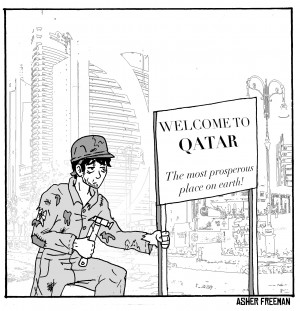
The soccer world’s attention is currently building hype for the 2014 FIFA World Cup in Brazil coming in June. While the pomp and circumstance is flooding in South America, the site of the 2022 game across the world is turning into a humanitarian crisis.
With the number of worker deaths related to the construction of the stadiums increasing, Qatar has proven to be an extremely poor choice on FIFA’s part to hold the 2022 World Cup.
It is clear that this country, while wealthy, does not have the capacity to protect its seemingly dispensable workers.
Currently, about 1,200 immigrant workers, many from Nepal, have died since 2010 when construction began. The International Trade Union Confederation estimates that at this rate, 4,000 people could lose their lives from the poor working conditions before the tournament begins in 2022.
This inhumane environment includes filthy, cramped work areas and unreasonable hours drudging in extreme temperatures according to the confederation’s report.
If these rates continue, Qatar will lose roughly .3 percent of its original 1.4 million workforce. To put it in perspective, this same percentage would result in over 950,000 deaths in the United States based on the census count of 316,000,000.
Sports governing bodies should not choose places like Sochi, Russia, or Qatar to hold such lavish events when these locations cannot handle the amount of work required.
While Sochi lacked the hospitable environment for a proper Olympics, Qatar does not have a suitable workers’ rights unions in place to provide better labor conditions and therefore prevent the climbing death toll.
Sporting events like the Olympics or World Cup are meant to celebrate the love of the game as well as prosper the area in which it’s held, whether via tourism or attention from the rest of the world.
However, the cost of this beautification effort shouldn’t be at the expense of human lives.
Some would argue that hosting world events like the World Cup do more harm than good to a country financially because it pours more money into preparing for the event rather than reap its meager benefits.
A third of the population in South Africa, the site of the last World Cup, lives on $2 or less a day, and holding an event of its magnitude seemed more than irresponsible.
Since Qatar is considered the richest country in the world with a gross domestic product upwards of $100,000 per capita, funding the event probably won’t break the country’s bank.
However, this does not make up for the countless people lost in preparing for the games.
When these sports governing bodies select a spot to host their big event, the clear solution is to choose an area that is already on its feet rather than make a charity case of an otherwise lackluster part of the world.
The location should first be able to afford the event, have a stable union and workers’ rights as well as a fortified government to stand strong for its citizens rather than sacrifice them.
By the time Qatar is ready for the World Cup, its people will be bereaving rather than basking in the overly confident financial and tourism prospects.